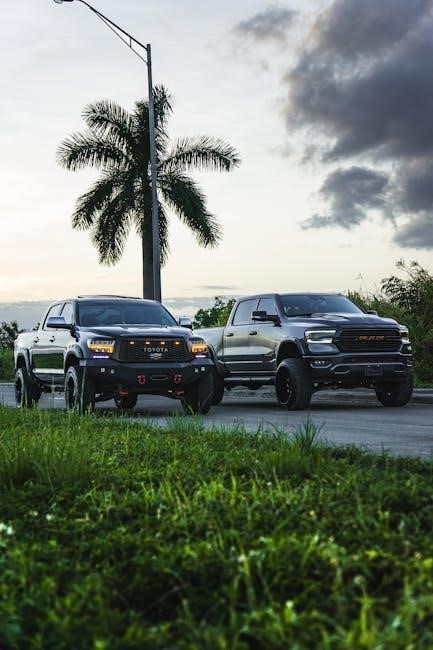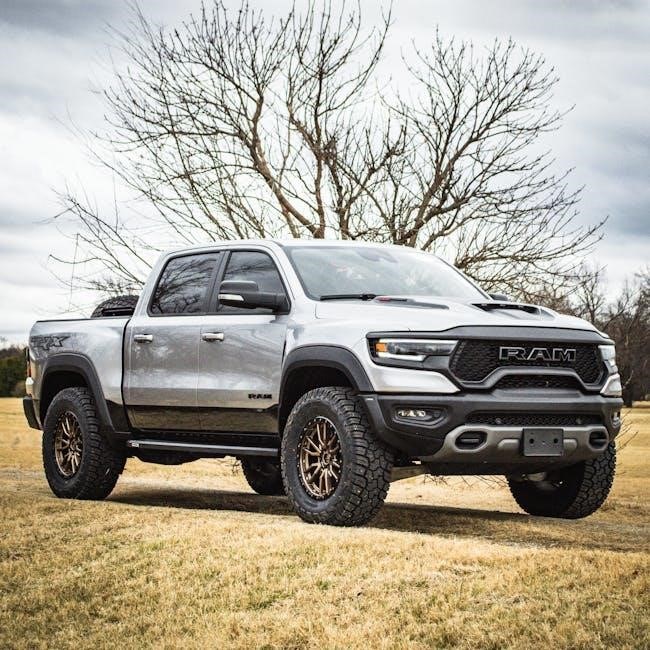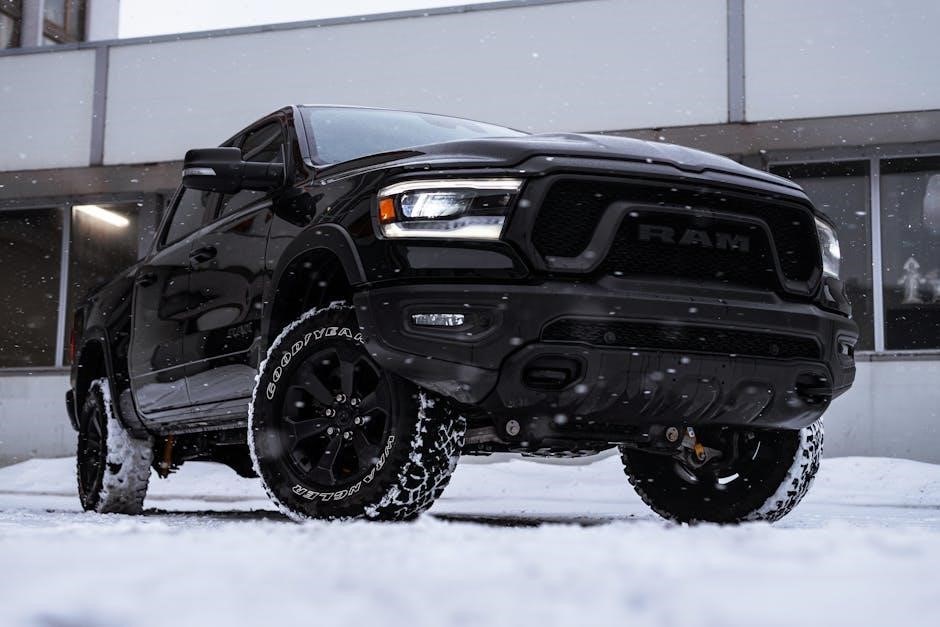Discover the ultimate RAM Trucks Towing Guide to maximize your truck’s potential.
Learn about towing capacities, techniques, and essential safety measures.
Explore equipment selection and best practices for a secure towing experience.
Overview of Ram Trucks Towing Capabilities
Ram trucks are renowned for their exceptional towing capabilities, making them a top choice for hauling heavy loads. With models like the Ram 2500 and 3500, these trucks can handle tens of thousands of pounds effortlessly. Their robust engineering ensures stability and control, even with maximum payloads. The 2025 Ram trucks, for instance, boast impressive towing capacities, while earlier models like the 2019 Ram 1500 have proven reliable for towing travel trailers. Factors such as axle ratios and payload capacity play a crucial role in determining their performance. Whether for work or recreation, Ram trucks deliver unmatched strength and reliability, ensuring safe and efficient towing experiences.
Importance of Proper Towing Setup and Safety
Proper towing setup and safety are critical to ensure a secure and accident-free experience. Incorrect configurations can lead to trailer sway, loss of control, or even accidents. Always adhere to your Ram truck’s towing capacity and guidelines to avoid overloading, which can compromise safety. Regular inspections of hitches, wiring, and brakes are essential to identify potential issues before they escalate. Additionally, proper weight distribution and hitch setup are vital for maintaining stability while towing. Neglecting these steps can result in unsafe conditions, especially at high speeds or in adverse weather. Prioritizing safety not only protects your vehicle and trailer but also the well-being of everyone on the road.

Understanding Towing Capacity
Towing capacity refers to the maximum weight your Ram truck can safely pull, ensuring efficient and secure hauling. Always follow manufacturer guidelines for optimal performance and safety.
Definition and Relevance of Towing Capacity
Towing capacity is the maximum weight a Ram truck can safely pull, including trailers and cargo, without compromising performance or safety. It is determined by the truck’s engine power, axle ratio, and chassis strength. Exceeding this limit can lead to damage or loss of control. Understanding towing capacity is crucial for ensuring safe and efficient hauling. It also helps prevent potential risks like trailer sway or brake failure. Always consult your vehicle’s specifications to avoid overloading. Properly matching the trailer weight to your truck’s capacity ensures a stable and secure towing experience. This information is vital for Ram truck owners to maximize their towing capabilities responsibly.
Factors Affecting Towing Capacity
The towing capacity of a Ram truck is influenced by several factors, including engine power, axle ratio, and chassis strength. The vehicle’s curb weight, passenger load, and additional features like four-wheel drive also play a role. Trailer type and weight distribution are critical, as uneven loading can reduce stability. Weather conditions, such as wind or inclines, further impact towing performance. Proper hitch setup and the use of weight-distributing systems are essential to maintain safety. Additionally, the truck’s gross combined weight rating (GCWR) must not be exceeded. Understanding these factors ensures safe and efficient towing, preventing potential risks like trailer sway or brake failure. Always consider these elements when planning a towing task with your Ram truck.
How to Find Your Ram Truck’s Towing Capacity
To determine your Ram truck’s towing capacity, start by consulting the owner’s manual, where specific ratings are listed. You can also check the manufacturer’s website or use the vehicle identification number (VIN) tool. Locate the VIN on the driver’s side doorjamb or windshield and enter it into the Ram Trucks website for precise towing data. Additionally, decals on the driver’s side door or inside the fuel filler door often display towing specifications. For personalized assistance, contact a Ram dealership with your truck’s details. Always verify the gross combined weight rating (GCWR) to ensure safe towing. This information is crucial for selecting the right trailer and maintaining safety while towing. Accurate data ensures your truck performs optimally without risking damage or safety hazards.

Choosing the Right Towing Equipment
Selecting proper towing equipment is crucial for safe and efficient towing. Start with a compatible hitch, wiring harness, and ball mount. Ensure all components are rated for your truck’s capacity and trailer type. Consult Ram specifications for recommendations. Proper equipment ensures secure connections and optimal performance. Always prioritize quality and compatibility to avoid safety risks and damage.
Types of Hitches for Ram Trucks
Choosing the right hitch is essential for safe and efficient towing. Ram trucks support various hitch types, including Class III, Class IV, and Class V receivers, each designed for specific weight ranges. Class III hitches are ideal for lighter trailers, while Class IV and V hitches are built for heavier loads, offering higher towing capacities. Additionally, gooseneck and fifth-wheel hitches are available for large trailers, providing superior stability and control. Weight distribution hitches are also recommended for uneven loads to enhance towing stability. Always ensure the hitch is compatible with your Ram truck’s towing capacity and the trailer type for optimal performance and safety.
Wiring Harnesses and Connectors for Towing
Proper wiring harnesses and connectors are critical for safe and reliable towing with your Ram truck. A towing wiring harness ensures seamless communication between your truck and trailer, powering lights, brakes, and auxiliary systems. Ram trucks often come with pre-wired connectors, simplifying installation. Common connectors include 4-pin, 6-pin, and 7-pin plugs, each designed for specific trailer types. Upgrading to a custom wiring harness can enhance compatibility and functionality. Always ensure connectors are clean and securely attached to avoid electrical issues.Consult your Ram truck’s manual or a professional installer to select the right wiring setup for your towing needs. Regular inspections of connectors and harnesses are essential to maintain safe towing operations.
Ball Mounts and Couplers: Selection Guide
Selecting the right ball mounts and couplers is essential for safe and efficient towing with your Ram truck. Ball mounts vary in drop and rise sizes, ensuring proper trailer alignment with your truck’s hitch. Choose a mount that levels the trailer when attached, ensuring stability. Couplers must match your trailer’s axle type and hitch class. Locking couplers add security, preventing theft. Always verify compatibility with your Ram truck’s towing setup. Regularly inspect for wear and tear, and ensure tight connections to avoid sway or detachment while towing. Properly pairing ball mounts and couplers ensures a secure and controlled towing experience, minimizing risks on the road.

Pre-Tow Checks and Safety Measures
Ensure your Ram truck and trailer are road-ready with thorough inspections of brakes, lights, and tire pressure. Always secure cargo properly and practice safe towing practices to minimize risks and ensure a smooth journey.
Inspecting Your Ram Truck for Towing Readiness
Before towing, inspect your Ram truck to ensure it’s prepared for the task. Check the VIN for towing capacity, tire pressure, and fluid levels. Verify brake function, suspension integrity, and hitch alignment. Ensure all lights and signals are operational for visibility. Review the owner’s manual for specific recommendations. Inspect the axle ratio and GCWR to avoid overloading. Check for any damage or wear on the frame, tires, or suspension. Ensure the truck is equipped with necessary towing features like a transmission cooler. Perform a test drive to confirm smooth operation. Address any issues before hitching to guarantee a safe and reliable towing experience. Proper preparation prevents accidents and ensures optimal performance. Always prioritize safety and efficiency. Regular inspections maintain your truck’s longevity and towing capability. Stay informed about your truck’s specifications to avoid overloading. A well-maintained Ram truck ensures confidence on the road.
Trailer Inspection Checklist
A thorough trailer inspection is essential for safe towing. Start by checking the tire condition, pressure, and tread depth. Ensure all brakes function properly and are synchronized with your Ram truck. Verify that all lights, including brake lights, turn signals, and running lights, are operational. Inspect the hitch and coupler for damage or wear, and ensure they are securely attached. Check the trailer frame for rust or structural damage. Examine the suspension and axles for stability. Test the wiring harness connections to prevent electrical issues. Inspect safety chains and ensure they are in good condition. Finally, confirm that the trailer is properly loaded, with weight evenly distributed. Address any issues before towing to ensure a safe and reliable experience. Proper trailer maintenance is crucial for preventing accidents and ensuring optimal performance. Regular checks help maintain your trailer’s longevity and towing reliability. Always prioritize safety and efficiency. Stay informed about your trailer’s specifications to avoid overloading. A well-maintained trailer ensures confidence on the road.
Weight Distribution and Hitch Setup
Proper weight distribution and hitch setup are critical for safe and efficient towing with your Ram truck; Ensure the trailer’s weight is evenly distributed, with 60% over the front axle and 40% over the rear. Use a weight-distributing hitch to maintain a level ride and improve control. Always follow the manufacturer’s guidelines for hitch installation and adjustment. Check the ball mount height to ensure it matches the trailer’s coupler height. Secure the coupler tightly and double-check all connections. Apply grease to moving parts for smooth operation. For heavier loads, consider upgrading to a high-capacity hitch. Proper setup ensures stability, prevents swaying, and maintains optimal braking performance. Regularly inspect the hitch and wiring for wear or damage. Adjust the weight distribution system as needed to maintain balance and safety. Always test the setup with a small load before towing heavier trailers. Follow torque specifications for all bolts and connections. Proper weight distribution enhances towing safety and reduces strain on your Ram truck.
Towing Techniques and Best Practices
Mastering towing techniques ensures safety and control while hauling heavy loads with your Ram truck.
Maintain a steady speed, use extended mirrors for visibility, and practice reversing in open spaces for better control;
Always stay alert, keep a safe distance, and avoid sudden maneuvers to prevent trailer sway or loss of balance.
Properly secure the load and ensure all connections are tight before starting your journey.
Following these best practices enhances towing efficiency and reduces risks on the road.
Basic Towing Techniques for Ram Trucks
Mastering basic towing techniques is essential for safely hauling trailers with your Ram truck. Always start by ensuring your truck and trailer are properly connected, with secure hitch and wiring connections. Before towing, conduct a pre-trip inspection to verify all lights, brakes, and suspension components are functioning correctly. When driving, maintain a steady speed and avoid sudden acceleration or braking, as this can cause trailer sway. Use extended mirrors for improved visibility, especially when changing lanes or reversing. Practice reversing in an open space to build confidence and control. Keep a safe distance from other vehicles and stay alert to road conditions. Proper weight distribution and balanced loading are critical for stability. By following these fundamental techniques, you can ensure a smooth and secure towing experience with your Ram truck.
Advanced Towing Tips for Heavy Loads
For towing heavy loads with your Ram truck, consider advanced techniques to enhance control and safety. Use a weight-distributing hitch to evenly spread the trailer’s weight, reducing strain on your truck’s rear axle. Always monitor your truck’s Gross Combined Weight Rating (GCWR) to avoid overloading. Invest in a high-quality brake controller and ensure it is properly calibrated for seamless braking. When towing large trailers, maintain a steady speed and avoid sudden maneuvers. Use extended towing mirrors for improved visibility, especially for wide or long trailers. Consider upgrading to heavy-duty suspension and tires for added stability. Regularly check tire pressure and coolant levels to prevent overheating. Finally, use real-time load monitoring systems to stay informed about your trailer’s weight distribution. By implementing these advanced towing strategies, you can confidently handle heavy loads with your Ram truck.
Handling Emergency Situations While Towing
In case of an emergency while towing, remain calm and act quickly to ensure safety. If your trailer begins to sway, gently ease off the accelerator and avoid sudden steering movements. For a tire blowout, maintain control and slowly move to the side of the road. Always carry a fire extinguisher, reflective triangles, and a first-aid kit. If your Ram truck or trailer experiences a mechanical failure, turn on hazard lights and secure the vehicle as soon as possible. Keep an emergency contact list handy, including roadside assistance. Regular maintenance can prevent many emergencies, but being prepared ensures safety and minimizes risks while towing heavy loads with your Ram truck.

Calculating Payload and GCWR
Calculating payload and GCWR is essential for safe towing. Payload refers to the truck’s maximum carry capacity, while GCWR includes the weight of the truck, trailer, cargo, and passengers. Understanding these limits ensures safe and efficient towing operations.
Understanding Payload and Its Importance
Payload refers to the maximum weight your Ram truck can safely carry, including passengers, cargo, and the tongue weight of a trailer. It is crucial to understand your truck’s payload capacity to avoid overloading, which can compromise safety and damage the vehicle. Exceeding the payload limit can lead to reduced braking efficiency, uneven weight distribution, and potential mechanical failures. Factors such as axle ratio, engine type, and cab configuration influence payload ratings. Always consult your truck’s specifications to determine its payload capacity. Properly managing payload ensures optimal performance, safety, and longevity of your Ram truck. Neglecting payload limits can result in costly repairs and increased risk of accidents while towing or hauling heavy loads.
Calculating Gross Combined Weight Rating (GCWR)
Gross Combined Weight Rating (GCWR) is the maximum weight of your Ram truck and trailer combined, including passengers, cargo, and fluids. To calculate GCWR, add the truck’s curb weight, payload, and the trailer’s weight. Exceeding GCWR can lead to reduced performance, safety risks, and potential damage to your vehicle. Always refer to your Ram truck’s specifications to determine its GCWR. Properly calculating and adhering to GCWR ensures safe towing and hauling practices. Consult your owner’s manual or a dealership for precise calculations tailored to your vehicle. Accurate GCWR management is critical for maintaining control and ensuring legal compliance while towing heavy loads.
Ensuring Safe Weight Distribution
Safe weight distribution is crucial for stable towing and hauling with your Ram truck. Properly distributing weight ensures even load transfer, preventing swaying or loss of control. Start by understanding your truck’s Gross Vehicle Weight Rating (GVWR) and payload capacity, as exceeding these limits can compromise safety. Always balance cargo evenly, avoiding concentration on one side. Use weight-distributing hitches to evenly spread the trailer’s tongue weight across the axle. Regularly check your load and adjust as needed to maintain balance. Proper weight distribution enhances towing stability, reduces wear on your truck, and minimizes the risk of accidents. Always consult your Ram truck’s owner’s manual for specific guidelines tailored to your vehicle’s capabilities.

Selecting the Right Trailer for Your Ram Truck
Choosing the right trailer for your Ram truck ensures compatibility, safety, and efficiency. Match the trailer type and weight to your truck’s towing capacity for optimal performance.
Types of Trailers Compatible with Ram Trucks
Ram trucks support a variety of trailers, including travel trailers, boat trailers, utility trailers, and horse trailers. Each trailer type is designed for specific purposes, ensuring compatibility with Ram’s towing capabilities. Travel trailers are ideal for camping, while boat trailers are perfect for water sports. Utility trailers are great for hauling heavy equipment, and horse trailers provide safe transport for livestock. Ram trucks, particularly the 2500 and 3500 models, are well-suited for heavier trailers due to their high towing capacities. Always match the trailer type and weight to your truck’s specifications for safe and efficient towing. This compatibility ensures optimal performance and prevents potential damage to both the truck and trailer.
Matching Trailer Weight to Your Truck’s Capacity
Ensuring your trailer’s weight aligns with your Ram truck’s towing capacity is critical for safe and efficient towing. Always consult your truck’s VIN-specific specifications or owner’s manual to confirm its maximum towing capacity. Gross trailer weight should never exceed this limit, as overloading can lead to reduced control, safety hazards, and potential damage to your vehicle. Consider the trailer’s dry weight and add the weight of cargo, fluids, and passengers to avoid overloading. For heavier trailers, Ram 2500 and 3500 models are ideal due to their higher capacities. Properly matching trailer weight to your truck ensures a stable and secure towing experience, minimizing risks and enhancing overall performance. Always prioritize weight distribution and use appropriate hitches for optimal safety.
Features to Look for in a Towing Trailer
When selecting a trailer for your Ram truck, prioritize features that enhance safety, durability, and compatibility. Look for a sturdy frame construction and a reliable axle and braking system to handle heavy loads. Ensure the trailer has a secure coupling mechanism and is equipped with wiring harnesses compatible with your truck’s connectors. Trailer weight distribution and suspension systems are crucial for stability. Consider trailers with built-in tie-down points for securing cargo and reflective lighting for improved visibility. Check the Gross Trailer Weight Rating (GTW) to ensure it matches your truck’s capacity. Additionally, rust-resistant coatings and durable tires can extend the trailer’s lifespan. Always opt for trailers with high-quality locking mechanisms for added security and storage compartments for organization.
Common Towing Mistakes to Avoid
Overloading, improper hitch setup, and ignoring safety checks are frequent errors. Always ensure weight limits, secure connections, and proper trailer alignment for safe towing experiences with your Ram truck.
Overloading Your Ram Truck
Overloading your Ram truck is a critical mistake that can lead to reduced braking efficiency, increased wear on components, and potential safety hazards. Exceeding the truck’s payload or towing capacity strains the engine, transmission, and suspension. This can result in premature wear, decreased fuel efficiency, and even engine failure. Always calculate the total weight of passengers, cargo, and the trailer to ensure it stays within the manufacturer’s specified limits. Regularly inspect your truck’s condition, especially the tires and brakes, to handle heavy loads safely. Consult your owner’s manual for precise weight ratings and guidelines to avoid overloading. Proper weight distribution and adherence to capacity limits are crucial for safe and efficient towing with your Ram truck.
Improper Hitch Installation
Improper hitch installation is a common mistake that can lead to unsafe towing conditions and potential accidents. A poorly fitted or misaligned hitch can cause the trailer to detach while in motion, posing serious safety risks. Ensure the hitch is properly bolted to the truck’s frame and secured with the correct hardware. Using the wrong ball mount or coupler size can also destabilize the trailer, leading to swaying or loss of control. Always follow the manufacturer’s instructions for hitch installation and double-check all connections before towing. Neglecting this step can result in damage to your truck, trailer, or other vehicles on the road.
Neglecting Regular Maintenance
Neglecting regular maintenance is a critical mistake that can compromise your Ram truck’s towing performance and safety. Over time, worn-out components like brakes, tires, and suspension systems can fail under the stress of towing, leading to costly repairs or accidents. Failing to inspect and maintain the cooling system can result in overheating, especially when towing heavy loads. Additionally, neglecting to check and replace fluids, such as transmission and differential oils, can cause premature wear on critical systems. Regular maintenance ensures your truck is in optimal condition for towing, preventing breakdowns and ensuring reliability. Always follow the recommended maintenance schedule to keep your Ram truck performing safely and efficiently while towing.

Maintenance and Upgrades for Towing
Regular maintenance and strategic upgrades are essential for optimizing your Ram truck’s towing performance. Ensure proper function of brakes, tires, and suspension systems for safe towing. Upgrading components like hitches, cooling systems, and transmission coolers can enhance towing capacity and reliability. Routine checks and timely repairs prevent breakdowns and extend your truck’s lifespan; Consider adding towing-specific accessories, such as weight distribution hitches, to improve stability and control. Always follow the manufacturer’s recommendations for maintenance and upgrades to ensure your Ram truck performs at its best while towing.
Regular Maintenance for Towing Efficiency
Regular maintenance is critical to ensure your Ram truck’s towing efficiency and safety. Start with routine checks of your brakes, tires, and suspension systems to maintain optimal performance. Inspect brake pads and rotors for wear, and ensure tires are properly inflated and aligned. Regularly service your transmission and engine to handle the strain of towing heavy loads. Don’t forget to check cooling systems, as towing can generate excessive heat. Lubricate all moving parts, including hitch components, to prevent friction and wear. Schedule annual inspections of your truck’s frame and axles to identify potential issues early. Consistent upkeep ensures your Ram truck remains reliable and capable of handling its maximum towing capacity safely and efficiently.
Upgrading Your Ram Truck for Better Towing Performance
Upgrading your Ram truck can significantly enhance its towing performance. Consider installing a heavy-duty axle with a higher gear ratio to improve torque and stability. Upgrade your suspension with stiffer springs or air bags to handle heavier loads without compromising ride quality. Enhance your engine’s performance with a cold-air intake or performance tuner to boost horsepower and torque. Additionally, upgrade your cooling system to manage increased heat from towing heavy loads. Installing a high-capacity transmission cooler and robust braking system can further improve control and safety. Finally, ensure your hitch is reinforced to handle maximum weight ratings. These upgrades work together to optimize your truck’s towing capabilities and ensure reliable performance under demanding conditions.
Enhancing Towing Safety with Accessories
Enhance your towing safety with essential accessories designed for Ram trucks. A backup camera provides clear visibility when aligning with your trailer, reducing the risk of accidents. Trailer brake controllers ensure synchronized braking between your truck and trailer, improving control. Heavy-duty weight distribution hitches help maintain even load distribution, preventing sway and instability. Additionally, consider trailer tire pressure monitoring systems to ensure optimal tire conditions. Installing high-intensity LED lights on your trailer enhances visibility to other drivers. Finally, always use trailer locks and tie-down straps to secure your load. These accessories collectively enhance safety, stability, and control while towing, ensuring a secure and confident experience on the road.
